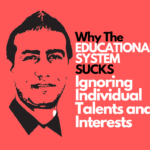Education is often touted as the key to success, personal growth, and societal progress. However, upon closer examination, it becomes evident that the educational system, as it exists today, is far from perfect. From its rigid structures to its emphasis on standardized testing, the system falls short of meeting the diverse needs of students and preparing them for the complexities of the modern world. In this article, we will explore some of the major flaws in the educational system and discuss potential avenues for improvement.
One of the most significant issues with the educational system is its one-size-fits-all approach. The system is designed to teach a large number of students simultaneously, leading to standardized curricula and rigid timelines. This approach fails to recognize that every individual has unique strengths, interests, and learning styles. Students are often forced to conform to a predetermined set of standards, stifling their creativity and inhibiting their ability to explore their passions. This cookie-cutter approach disregards the diverse talents and potential of students and fails to nurture their individual growth.
Furthermore, the focus on standardized testing has become an obsession within the educational system. The emphasis on test scores has led to a narrowing of the curriculum, with schools prioritizing test preparation over holistic learning. The pressure to perform well on exams has created a culture of stress and anxiety among students, rather than fostering a love for learning. Moreover, the overreliance on test scores as a measure of success neglects other essential aspects of education, such as critical thinking, creativity, and problem-solving skills. Students are reduced to mere test-takers, and their intellectual curiosity is often ignored or suppressed.
Another critical flaw in the educational system is its lack of relevance to real-world contexts. The disconnect between classroom learning and practical application leaves students ill-prepared for life beyond school. The focus on memorization and regurgitation of information often fails to equip students with the skills necessary to navigate the complexities of the modern world. Subjects such as financial literacy, emotional intelligence, and practical life skills are often neglected in favor of traditional academic disciplines. As a result, students graduate without the necessary skills to succeed in their personal and professional lives.
Additionally, the educational system tends to prioritize academic achievements over holistic development. The pressure to excel academically often leads to a neglect of students’ mental health and overall well-being. Students are pushed to meet unrealistic expectations, leading to burnout, anxiety, and a lack of self-confidence. The system fails to provide adequate support and resources for students’ emotional and psychological needs. A well-rounded education should prioritize not only academic knowledge but also the social, emotional, and physical development of students.
The traditional classroom structure itself is another area where the educational system falls short. The model of a teacher lecturing at the front of the class while students passively absorb information is outdated and ineffective. It fails to engage students actively in the learning process and limits their ability to develop critical thinking and problem-solving skills. A more student-centered approach, where learning is collaborative, interactive, and tailored to individual needs, can foster a deeper understanding and retention of knowledge.
While it is easy to criticize the flaws in the educational system, it is equally important to explore potential solutions. To address these issues, a paradigm shift is necessary. Education should be reimagined as a lifelong process that goes beyond the confines of a classroom. It should focus on nurturing students’ natural curiosity, fostering a love for learning, and equipping them with the skills necessary for success in the 21st century.
Implementing a more personalized approach to education is essential. This involves recognizing and celebrating the diverse strengths and talents of students, providing them with opportunities to explore their interests and passions, and tailoring instruction to their individual needs. Technology can play a crucial role in this transformation by providing personalized learning platforms and resources that adapt to each student’s learning style and pace.
Emphasizing holistic education is also vital. Schools should prioritize the development of critical thinking, creativity, problem-solving, and collaboration skills alongside academic knowledge. Teaching practical life skills, financial literacy, and emotional intelligence should be integrated into the curriculum. Moreover, mental health support should be readily available to students, ensuring their overall well-being is prioritized.
Lastly, a shift in assessment practices is necessary. Moving away from solely relying on standardized testing, educators should employ a more comprehensive and multidimensional approach to evaluate students’ progress. Portfolios, projects, presentations, and real-world application of knowledge can provide a more accurate representation of students’ abilities and growth.
In conclusion, while the educational system has its merits, it is essential to critically examine its flaws and work towards meaningful improvements. By embracing personalized learning, holistic education, and innovative assessment practices, we can create an educational system that nurtures the potential of every student, equips them with the skills necessary for success, and fosters a love for lifelong learning. It is time to reimagine education and ensure that it becomes a transformative and empowering experience for all learners.




